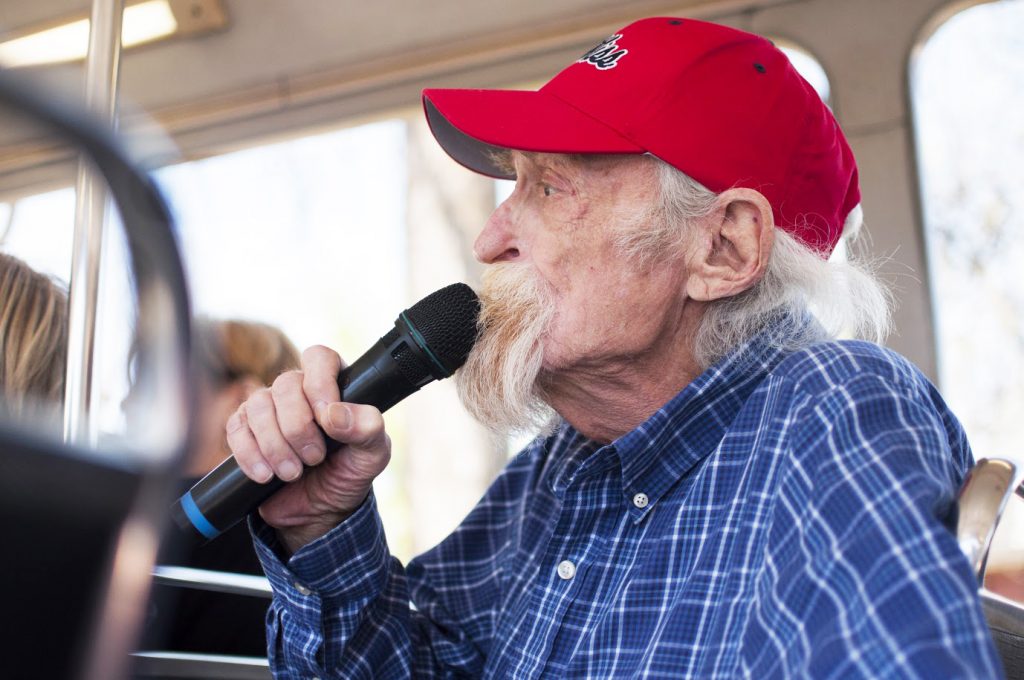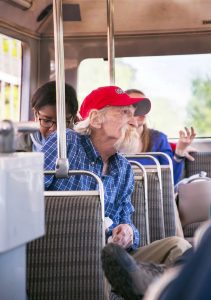
Jack Mayfield poses in front of a double-decker bus at the Visit Oxford office. Photo by Devna Bose
Jack Mayfield sits in a cushioned chair on the top floor of Square Books with one hand resting on his knee. He speaks assuredly, and his eyes are wise. Pausing every few minutes to cough into the back of his hand, he profusely apologizes, explaining he has trouble speaking now after his bout with throat cancer. For a man whose job relies on conversation and storytelling, this ailment hasn’t slowed him down a bit.
“My family history goes back to the beginning, when the county was formed,” he starts his story.
Mayfield’s great-great-grandmother came to Oxford in the late 1830s as one of the first settlers in Lafayette County. A fifth-generation Oxonian, Mayfield grew up in town and graduated from Ole Miss in 1969. After college he left Oxford, though he didn’t get too far. He worked office jobs in Jackson and Memphis for a number of years before returning home in 1990.
“My family has just always been here. I had a home here,” he said. “I just always loved Oxford – the slow-paced life, a lot to do, everything you need.”
When he came back home, Mayfield decided he wanted to teach, so he went back to school and earned his master’s degree in history. A love for the subject is deeply ingrained in Mayfield.
“Lots of people have hobbies like golf or tennis, but mine was history,” he said. “I had an aunt who was a history teacher for years, and she would just buy me history books as a kid. I loved hearing about people and events, so I just love history, and I wanted to try teaching to see what it was like.”
After teaching at a few local schools such as South Panola High School and Northwest Mississippi Community College, Mayfield began writing a column for the Oxford Eagle in 2004. He did that for 12 years and wrote approximately 600 pieces before he received a call one day from Visit Oxford director Mary Allyn Hedges, who asked him if he could do a double-decker bus tour for a group.
“I said, ‘Sure, I’d be glad to,’” Mayfield recalled. “I made a little itinerary driving around town. It just started from that.”
Mayfield has been leading bus tours ever since.
Double-decker bus tours have been an iconic part of Oxford’s culture since the buses were imported from England in 1994. Usually starting at the Visit Oxford tourism office, the buses travel up and down the narrow streets surrounding the Square and venture onto campus so that riders can enjoy springtime views of the Grove.

Jack recalls stories of historic buildings and landmarks on the Square. Photo by Devna Bose
When Mayfield first began giving double-decker bus tours, he brought his grandson. During tours, Mayfield kept a stack of notecards containing important information he planned to mention during the tour, and his grandson wanted to hold the cards. On one of his first ride-alongs, Mayfield’s grandson accidentally dropped the stack, shuffling all of the notes. As luck would have it, Mayfield remembered enough to give the entire tour from memory. Since that day, his method hasn’t changed much.
“I say whatever pops in my mind,” he said. “You might hear one story one time and one story another time.”
Throughout the approximately hour-long tour, Mayfield vividly describes historic events around town, recalls past Oxonians and their stories and cracks a number of jokes about his least favorite collegiate team: LSU.
“When we drive past the Grove, I say we love for our opponents to come by and have a drink with us, except we don’t like people who wear purple and gold. They’re the most obnoxious people, and they smell like corndogs,” he said. “It never fails – there’s always somebody on the bus from LSU. It works real well when we have Texas A&M people in town.”
Oxford’s double-decker buses have served the town for more than 20 years and are considered a staple on the Square, especially during the spring. As popular as the buses are, however, local historian Mayfield is just as much of a local attraction as the buses.

Jack Mayfield looks out of the window toward the Grove. Photo by Devna Bose
“Jack is a true asset and ambassador for the City of Oxford,” Hedges said. “He is a wealth of knowledge with an ability for storytelling (that) bring(s) history to life. Jack is a treasure for Oxford, and his bus tours are an experience for both visitors and locals alike.”
A true Oxonian, Mayfield lights up when he recalls the history of his hometown and the memories he has made in it.
“[Oxford is] the crossroads of history,” he said. “So much has happened here and come through here.”
Part of Mayfield’s love for Oxford and its story comes from his close ties to the area.
“Growing up here, knowing the family names and family lineage… it’s so nice to put something together about someone you know and someone who was in their family,” he said. “It makes it more interesting.”
According to Mayfield, he grew up in Oxford during its athletic “heyday,” when everyone in Oxford was an Ole Miss fan. He remembers hundreds of fun days on campus, including one time in which he used a car hood to sled down a steep bank.
“Over there by the Student Union, there used to be a football field. It had a bank that came down and had a drainage ditch. When it snowed once when we were teenagers, we started sledding on that incline. When you came to that drainage ditch, you would go airborne and land in the field,” he recalled. “When you have fond memories about a place like that, it just pulls you into it, and you become a part of it.”
Over the years, Mayfield has seen his town, his home and his campus grow to become, in his opinion, a better and more welcoming community.
“We, in the South, hate to offend, and [contextualization] is a good way to show that we’re taking initiative. What we’re doing is putting everything in context of what the time and the period were, because then it becomes a teaching tool. You understand the tenor of the people, and I think it shows that we are not ashamed of what happened,” he said. “[Oxford has] changed for the good. We’re getting more into the 21st century and owning up to our past at the same time.”
History isn’t the only thing keeping Mayfield here, though. He said the natural friendship and kindness among citizens of a town as charming as Oxford keep him here, and no one loves Oxford more than Mayfield.
“I always tell people we are not like other Mississippi towns,” he said. “It’s that sense of place. It’s where your deep-running vein always travels to, no matter where you go. It always comes back to the one place – everything you know, everything you feel. It’s an integral part of your life.”

Jack Mayfield pauses in between anecdotes on the tour to take a breath. Photo by Devna Bose






